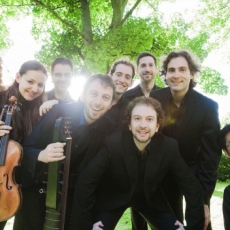
Profeti della Quinta - Live Review - Bachtrack
For many members of the public gathered in Montreal's Tudor Hall on Wednesday evening, both the music of Salomone Rossi and the featured vocal performers, Profeti della Quinta, were unknown. Two hours later, after a wondrous voyage of discovery and a rousing standing ovation, all seemed convinced of Rossi's neglected genius and the ensemble's supreme quality. Though re-located from the Salle Bourgie, which had literally sprung a leak, and despite a mini snow-storm, Profeti della Quinta attracted a keenly enthusiastic audience to the beautiful and intimate Tudor Hall.
The concert's title, Il Mantovano Hebreo (The Mantuan Jew), announced the evening's double vocation: to allow us to discover not only the moving beauty of Rossi's Italian secular polyphonic madrigals and canzonettas, but also to appreciate his innovative devotional Hebrew music. Rossi was born around 1570 and apparently died in 1630 after the Austrian invasion of Mantua. A court musician for the all-powerful Gonzaga family, Rossi was not only an admired violinist but a colleague of such fellow composers as Monteverdi and Gastoldi and other members of what later became known as the Camerata Fiorentina. In many respects, Rossi represents a bridge between the late Renaissance and early Italian Baroque periods. His vocal style resembles that of his more celebrated namesake Luigi Rossi, and, in the madrigals especially, Monteverdi. But there is a lyricism, a rejoicing in the purely vocal aspect of his writing, as in the affecting 'Rimanti in pace', that is strikingly original. Equally noteworthy are the Italian settings of the poems of Giovanni Battista Guarini, who seemed to constantly inspire Rossi to new polyphonic or even solo heights, as in the dramatic and effective 'Ohime se tanto amate'. As for the five-part madrigals presented by Profeti, most especially the glorious 'Cor mio, deh non languire', their great emotional impact was in large part due to a cappella vocal lines of penetrating and entwined suppleness and an apparent ease of execution that hid a hugely sophisticated polyphonic richness and a keen musical awareness on behalf of the performers.
The same vocal characteristics distinguish Rossi's unique musical approach to the Jewish liturgy. Divorced from traditional cantoral music and marking a revolutionary step in the setting of Hebrew prayers and psalms, these pieces often employ the madrigal style to heighten the emotional impact of the music. This was particularly evident in Rossi's four-part setting of Psalm 146, 'Haleluyah, Haleli nafshi ‘et ‘adonai', and the sublime duet 'Shchora ani ve'nava' for two castrati (or canto if you prefer). The latter is an excerpt from the Song of Songs arranged for voice, harpsichord and chitarrone by Elam Rotem, who is both the bass and the harpsichordist of Profeti della Quinta.
Rotem founded the ensemble in the Galilee region of Israel several years ago but the five singers, as well as the skilled and eloquent chitarrone player Ori Harmelin, are now based in Basel, Switzerland, after studying at the Schola Cantorum Basiliensis. The group first came to international prominence when they won the 2011 York Early Music International Young Artists Competition. This was followed by Joseph Rochlitz's documentary Hebreo: The Search for Salomone Rossi, which charted Profeti's quest to discover Rossi's music and perform it in Mantua. They specialise, but not exclusively, in repertoire from the sixteenth and early seventeenth centuries.
Profeti brings an academician's rigour to performance practice, and their performances, though spontaneous and vital, are honed to near-perfection. Tuning, ornamentation and ensemble singing are all exemplary. Though the ensemble is musically polished, their sound fully integrated and remarkably balanced, it must be said that they are fortunate to have the astounding Doron Schleifer as the lead countertenor. His duet with fellow countertenor David Feldman was one of the highlights of the evening. What sets Profeti della Quinta apart, however, is their individual and collective musicality. They have an uncanny sense of pulsation and rhythm. Their limpid approach to a phrase is constantly natural and above all musical. The variety of colour, the expressive palette and the dynamic range they employ are breath-taking, as are their vowel colouration and linguistic precision. Profeti della Quinta are simply one of the most impressive vocal ensembles heard in a long while. They are part of a major and worldwide renaissance in vocal ensemble singing and as this concert amply demonstrated, they have also helped give Salomone Rossi's music a new lease on life. With apologies to Mister Spock, may Profeti della Quinta live long and continue to prosper.